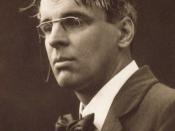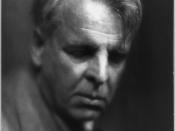SummaryThe speaker, referring to the country that he has left, says that it is "no country for old men": it is full of youth and life, with the young lying in one another's arms, birds singing in the trees, and fish swimming in the waters. There, "all summer long" the world rings with the "sensual music" that makes the young neglect the old, whom the speaker describes as "Monuments of unageing intellect."An old man, the speaker says, is a "paltry thing," merely a tattered coat upon a stick, unless his soul can clap its hands and sing; and the only way for the soul to learn how to sing is to study "monuments of its own magnificence." Therefore, the speaker has "sailed the seas and come / To the holy city of Byzantium." The speaker addresses the sages "standing in God's holy fire / As in the gold mosaic of a wall," and asks them to be his soul's "singing-masters."
He hopes they will consume his heart away, for his heart "knows not what it is"--it is "sick with desire / And fastened to a dying animal," and the speaker wishes to be gathered "Into the artifice of eternity."The speaker says that once he has been taken out of the natural world, he will no longer take his "bodily form" from any "natural thing," but rather will fashion himself as a singing bird made of hammered gold, such as Grecian goldsmiths make "To keep a drowsy Emperor awake," or set upon a tree of gold "to sing / To lords and ladies of Byzantium / Or what is past, or passing, or to come."FormThe four eight-line stanzas of "Sailing to Byzantium" take a very old verse form: they are metered in iambic pentameter, and rhymed ABABABCC, two...


